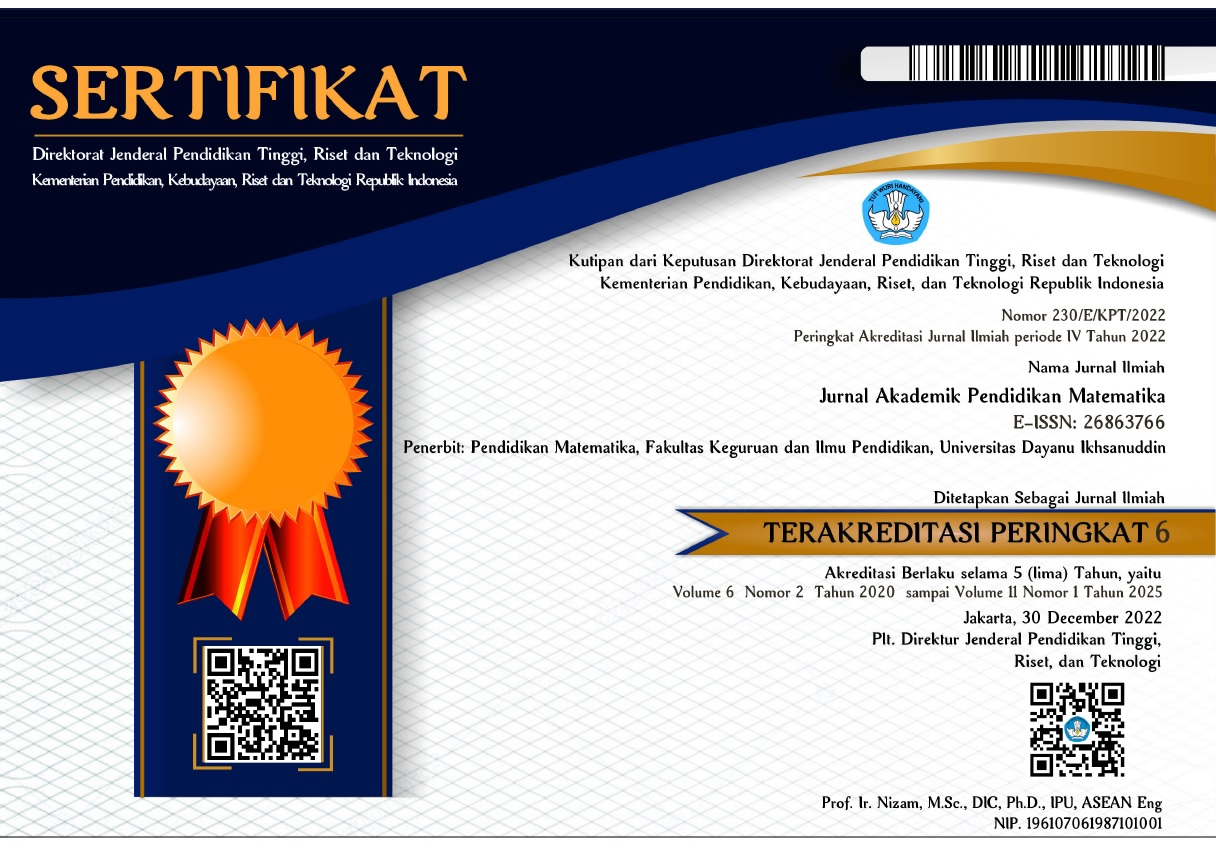Observasi Mental Model Penjumlahan Bilangan Bulat Siswa Sekolah Dasar Kota Baubau
DOI:
https://doi.org/10.55340/japm.v7i2.438Kata Kunci:
observasi, bilangan bulat, mental modelAbstrak
Keterampilan atas sistem bilangan bulat merupakan kompetensi pokok dalam mengambangkan pembelajaran pada sitem bilangan lainnya yang lebih kompleks, namun masih banyak siswa yang belum cukup cakap atas kompetensi tersebut. Penelitian ini merupakan penelitian etnografi dengan tujuan untuk mendeskripsikan mental model dan sifat konsistensi bilangan bulat yang menjadi pengalaman belajar siswa pada sekolah dasar Kota Baubau. Penelitian ini memberikan informasi bahwa mental model siswa sekolah dasar Kota Baubau yang terdapat pada pembelajaran bilangan bulat yaitu mental model inisial, mental model sintetis dan mental model formal. Siswa dalam mengerjakan operasi penjumlahan bilangan bulat masih menunjukkan ketidakkonsistenanya saat menggunakan media garis bilangan sebagai alat bantunya.
Unduhan
Referensi
Badriyah, L., Asari, A. R., Malang, U. N., Timur, J., & Susanto, H. (2016). Profil Kesalahan Siswa SMP dalam Menyelesaikan Operasi Hitung Bilangan. January 2017.
Bartle, R.G;Shebert, D. . (2011). Introduction to Real Analysis (4th ed.). John Wiley & son.
Bell, Frederick, H. (1981). Teaching and learning Mathematics (in swcondary schools). Wm. C. Brown.
Bofferding, L., & Bofferding, L. (2014). No Title. 45(2014), 194–245.
Bolyard, J., & Moyer-Packenham, P. (2012). Making sense of integer arithmetic: The effect of using virtual manipulatives on students’ representational fluency. Journal of Computers in Mathematics and Science Teaching, 31(2), 93–113. http://www.editlib.org/p/39192/paper_39192.pdf
Creswell, J. . (2012). Educational Resarch (4th ed.). Pearson.
Fraleigh; J.B; Brand N.E. (2021). A First Course in Abstract algebra (8th ed.). pearson.
Fuadiah, N. F., & Suryadi, D. (2017). Some Difficulties in Understanding Negative Numbers Faced by Students : A Qualitative Study Applied at Secondary Schools in Indonesia. 10(1), 24–38. https://doi.org/10.5539/ies.v10n1p24
Fuadiah, N. F., Suryadi, D., & Turmudi. (2019). Teaching and learning activities in classroom and their impact on student misunderstanding: A case study on negative integers. International Journal of Instruction, 12(1), 407–424. https://doi.org/10.29333/iji.2019.12127a
Lee, J. (2014). Explanations , illusion of explanations , and resistance : Pre-service teachers ’ thoughts on models for integer operations Explanations , Illusion of Explanations , and Resistance : Pre-service Teachers ’ Thoughts on Models for Integer Operations. October.
Norton, A., & Alibali, M. W. (2019). Constructing number: Merging perspectives from psychology and mathematics education. 370. http://link.springer.com/10.1007/978-3-030-00491-0
Retnowati, S., Amin, S. M., & Imah, E. M. (2018). The Role of Refutational Text as a Conceptual Change Effort to Fix the Misconception on Addition and Subtraction of Integers. Journal of Physics: Conference Series, 1108(1). https://doi.org/10.1088/1742-6596/1108/1/012117
Rubin, R. J., Marcelino, J., Mortel, R., & Lapinid, M. R. C. (2014). Activity-Based Teaching of Integer Concepts and its Operations. 1–16.
Schindler, M., Hußmann, S., Nilsson, P., & Bakker, A. (2017). Sixth-grade students’ reasoning on the order relation of integers as influenced by prior experience: an inferentialist analysis. Mathematics Education Research Journal, 29(4), 471–492. https://doi.org/10.1007/s13394-017-0202-x
Sulastri, R.; Mautia, H.; Johar, R.; Ikhsan, M. ;Duskri. . (2017). Identifikasi Kendala dan Masalah Dalam Proses Pembelajaran Matematika. 1, 285–288.
Wulandari, Y. O., & Damayanti, N. W. (2019). Scaffolding Based on Telolet Game in Teaching Integers. Malikussaleh Journal of Mathematics Learning (MJML), 1(2), 36–39. https://doi.org/10.29103/mjml.v1i2.1175



























